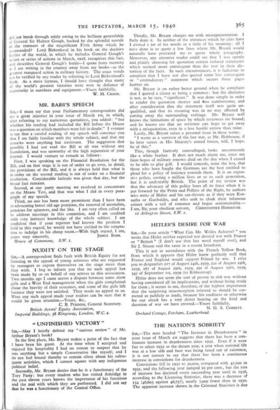is UNFINISHED VICTORY "
Sitt,—May I briefly defend my " curious review " of Mr. Arthur Bryant's book?
In the first place, Mr. Bryant makes a point of the fact that I have been his guest. At the time when I accepted and enjoyed his hospitality I had no reason to suspect that he was anything but a simple Conservative like myself; and I do not feel bound thereby to remain silent about his subse- quent activities, which I cannot square with any indigenous political belief.
Secondly, Mr. Bryant denies that he is a functionary of the Tory Party: but every student who has visited Ashridge in the past eleven years knows the importance of his functions and the zeal with which they are performed. I did not say that he was a functionary of the Central Office.
Thirdly, Mr. Bryant charges me with misrepresentation. I flatly deny it. In neither of the instances which he cites have I altered a jot of his words or a tittle of his meaning : all I have done is to quote a few lines where Mr. Bryant would naturally have preferred me to quote whole paragraphs. Moreover, any attentive reader could see that I was openly and plainly choosing for quotation certain isolated statements which seemed more extravagant than the rest in their dis- tortion of the facts. In such circumstances, it is ludicrous to complain that I have not also quoted some less extravagant or * contradictory " statement which occurs three pages further on.
Mr. Bryant is on rather better ground when he complains that I quoted a clause as being a sentence : but the alteration is not, as he says, " significant." It was done simply in order to render the quotation shorter and less cumbersome, and after consideration that the statement itself was quite un- qualified, and that its meaning was in no way affected by cutting away the surrounding verbiage. Mr. Bryant well knows the limitations of space by which reviewers are bound; and he knows too that no reviewer can hope to get away with a misquotation, even in a less hostile review than mine.
Lastly, Mr. Bryant raises a personal issue in these terms : " I wrote as a survivor of the last war, as Mr. Hobhouse, if he later serves in His Majesty's armed forces, will, I hope, be of this."
This, though furtively camouflaged, looks uncommonly like a white feather. It does not much alarm me, since my faint hopes of military renown died on the day when I ceased to be able to play golf. I would concede, none the less, that those who have fought the Germans are the best entitled to plead for a policy of leniency towards them. It is an expen- sive policy, costing a million lives or so to each generation, but it is undeniably British. The point of my review was that the advocacy of this policy loses all its force when it is put forward by the Pritts and Pollitts of the Right, by authors who write of Hitler and his cut-throats as if they were Kos- suths or Garibaldis, and who seek to cloak their infamous crimes with a veil of romance and bogus sentimentality.— I am, Sir, your obedient servant, CHRISTOPHER HOBHOUSE.
12 Arlington Street, S.W. I.






















































 Previous page
Previous page